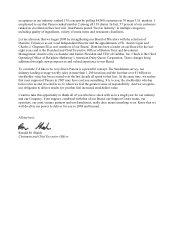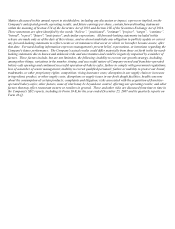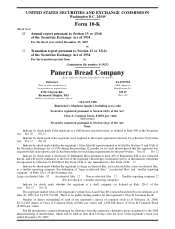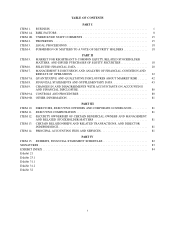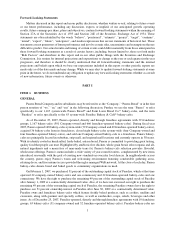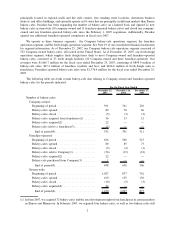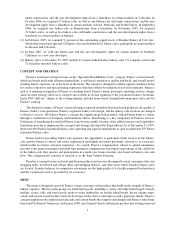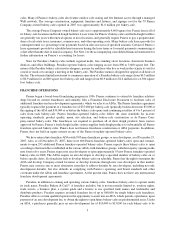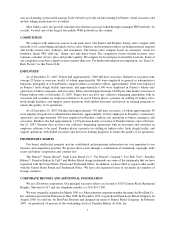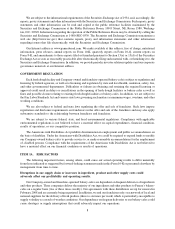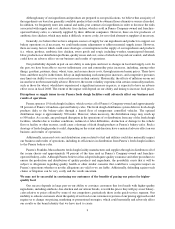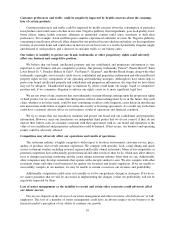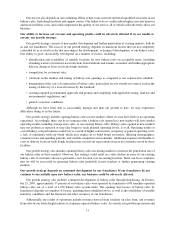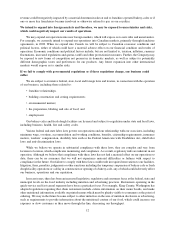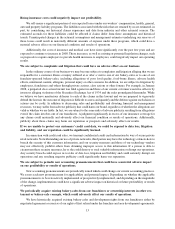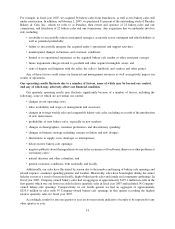Panera Bread 2007 Annual Report Download - page 16
Download and view the complete annual report
Please find page 16 of the 2007 Panera Bread annual report below. You can navigate through the pages in the report by either clicking on the pages listed below, or by using the keyword search tool below to find specific information within the annual report.opened under the ADA and an initial franchise fee of up to $40,000 for each bakery-cafe developed under the ADA.
Paradise has entered into franchise agreements with 10 franchisee groups, or area developers, as of December 25,
2007. Also, as of December 25, 2007, there were 32 Paradise franchise-operated bakery-cafes open and commit-
ments to open 10 additional Paradise franchise-operated bakery-cafes. Paradise expects its franchisees to open
approximately 5 new Paradise franchise-operated bakery-cafes in 2008.
BAKERY-CAFE SUPPLY CHAIN
Panera bakery-cafes use fresh dough for their artisan and sourdough breads and bagels. Fresh dough is supplied
daily to both Panera Company-owned and franchise-operated bakery-cafes by Panera fresh dough facilities, which
together are referred to as Panera’s bakery-cafe supply chain. As of December 25, 2007, there were 20 Panera fresh
dough facilities, 19 of which were Company-owned and one of which was franchise-operated.
Panera believes its fresh dough facility system provides a competitive advantage. The fresh dough facilities
ensure consistent quality and supply of fresh dough products to both Panera Company-owned and franchise-
operated bakery-cafes. Panera focuses its growth in areas that allow it to continue to gain efficiencies through
leveraging the fixed cost of the fresh dough facility structure. Panera will also selectively enter new markets which
requires the construction of additional fresh dough facilities when sufficient numbers of bakery-cafes are opened
that permit efficient distribution of the fresh dough. The fresh dough distribution system delivers product daily to
bakery-cafes. Distribution is accomplished through a leased fleet of temperature controlled trucks operated by
Panera associates. At December 25, 2007, Panera leased 169 trucks. The optimal distribution range is approx-
imately 300 miles; however, when necessary, the distribution ranges may be up to 500 miles. An average
distribution route delivers dough to seven bakery-cafes. Panera believes there are numerous suppliers of its needed
product ingredients and Panera could obtain ingredients from an alternative supplier if necessary.
Panera has contracted externally for the supply of the remaining baked goods in the bakery-cafes, referred to as
sweet goods. Sweet goods products are completed at each bakery-cafe by professionally trained bakers. Completion
includes finishing with fresh toppings and other ingredients and baking to established artisan standards.
Panera uses independent distributors to distribute sweet goods products, tuna and other materials to bakery-
cafes. With the exception of fresh dough products and the majority of Panera’s cream cheese supplied by the fresh
dough facilities, virtually all other food products and supplies for Panera retail operations, including paper goods,
coffee, and smallwares, are contracted for by Panera and delivered by vendors to an independent distributor for
delivery to the Panera bakery-cafes.
Panera franchise-operated bakery-cafes operate under individual contracts with one of Panera’s distributors.
As of December 25, 2007, there were three primary distributors serving the Panera system.
MANAGEMENT INFORMATION SYSTEMS
Each Panera Company-owned bakery-cafe has computerized point-of-sale registers which collect transaction
data used to generate pertinent information, including, among other things, product mix and average check. All
product prices are programmed into the point-of-sale register from Panera’s headquarters office. Panera allows
franchisees, that elect to do so, access to certain of its proprietary bakery-cafe systems and systems support.
Franchisees set their own menu prices.
Panera uses in-store enterprise application tools to assist in labor scheduling and food cost management, to
provide corporate and retail operations management quick access to retail data, to allow on-line ordering with
distributors, and to reduce managers’ administrative time. The system supplies sales, bank deposit, and variance
data to Panera’s accounting department on a daily basis. Panera uses this retail data to generate daily and weekly
consolidated reports regarding sales and other key metrics, as well as detailed profit and loss statements for each
Panera Company-owned bakery-cafe. Additionally, Panera monitors the average check, customer count, product
mix, and other sales trends. Panera also uses this retail data in its “exception-based reporting” tools to safeguard its
cash, protect its assets, and train its associates. The Panera fresh dough facilities have computerized systems which
accept electronic orders from the bakery-cafes and deliver the ordered product back to the bakery-cafes. Panera also
6


